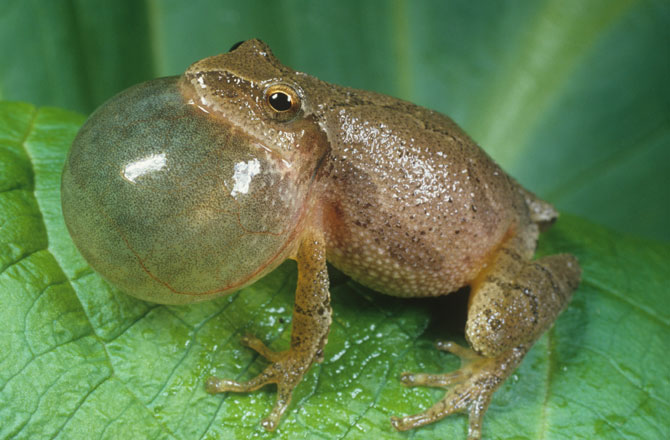(Image courtesy of Discovery News)
It’s that time of year again when the call of peepers entices my ear with their full-throated mating chorus. They are my favorite sound of spring. Unfortunately, I no longer hear them from home as I used to.
I have asked herpetologists why the peepers aren’t coming to my pond any longer. One conjecture was that the American Toads, that have a lower call and larger body, have been eating these small creatures. They say that peepers need reeds and shallow water to protect them.
Last spring I brought a bucket full of peeper tadpoles to a very small water hole that I dug in an effort to bring them back. There were no American Toads there and it was far from my pond. Still no peepers.
If any of you know anything about peeper habitat please send me your ideas for how I might re-introduce them. My fear is that something terribly wrong is happening to frogs, as it is with many other creatures in our environment. We have no pesticides or herbicides used anywhere near our land, so it’s unlikely that, but something is discouraging these heralds of spring from returning here.
Last weekend my husband and I climbed a small mountain near our home, and to our delight when we got to the top, we were enchanted by the sounds of peepers. Here’s what we found. Just press on the word “VIDEO” to hear them: VIDEO.
This is the smile that peepers bring to our faces!
What is your favorite spring sound?




Dear Eileen,
Here is a poem I wrote to add to your wild experience.
Peepers
Brilliant and heartening notes
carry beyond and over and under
and around
you.
Circling until melodies are like
kisses.
ng 4/28/15
I love the last two lines especially, Norm. They really capture my feeling as well. Thanks!
We found, as being caretakers for the same pond for many years, that when there were rainbow trout in the pond, there were no peepers. When the rainbow trout died out and there were only brook trout, the peepers returned. We thought that the rainbow trout must like to eat some stage of the peepers life cycle. We were so glad when they returned!
Thanks for the feedback Dana. We thought that might have been the problem years ago, but we no longer have trout and they are still dying. Our next best guess is American toads and bullfrogs, who we suspect have made mincemeat out of the tadpoles we imported! Lucky you that yours have returned! Thanks for writing. My best to you and Daniel.
Is this knowledgeable peepers comment from the artist Dana Hugg who used to live in a tipi in the Randolph area of Vermont? My husband and I were the tipi-dwellers across the valley on the facing mountainside from you and your husband. Would like to be back in touch again (after all, it’s only been about 30 years!).
Love you,
Stephani
P.S. Much thanks to blogger Eileen for this rare opportunity! And I love peepers too.
I remember the first week in May last year you were here at South Meadow and we heard the peepers here for the first time. I am waiting for them.
Oh how I remember. It filled my heart with joy. I will travel around by car this week to hear them. All best. Eileen
Jeepers, creepers, where’d you get those peepers?
Hahaha!
I’ll just add they’re some loud leapers!
Hi Eileen, Happy May 1st, or still April 30th, April Genius’ Day, as I call it, being that the 1st of April is the Fool’s Day.
Sorry to read that the Peepers are fewer. These seasonal animals are great indicators of changes, but this one, could be so many factors. I was looking at a site: http://amphibiaweb.org/declines/declines.html and it mentioned the usual ones and I remembered that the issue of the Frogs has been on the radar too, as a global indicator of changes.
They are amazing animals, wow, they can go even more torpid than the Hummingbirds, some parts can even be ice-frozen and return… and it was interesting to see that the males leave the ponds and hang out a few feet above the ground in the nearby woods and brushes. I never saw them camping as a kid in Ontario, just the big Bullfrogs, but on SaltSpring, in the Pacific Northwest, it is Just warm enough to have tree-frogs, like the Peepers, same size but Green and camouflage-color changing, and they were amazing animals, like jewelry.
We would go at night to try to see them at the marsh and they would all stop and there was one always around the tent and the kids even caught one in the tent in March, but if you searched, they would always be quite as you approached…:)
So many factors, like even just basic mowing etc… or worked or disturbed brush or fields may disturb areas near the ponds where they hibernate over the winter and mate and hunt, as they seem to live much in the marshes, but also very much on dry lands and detritus nearby. We found them sometimes 50 ft out in the middle of a field nearby, in the lows of the long grass.
Acidity of the pond maybe? Maybe the warmth of the pond?. With warming maybe it could effect the lower grubs and foods. Maybe the pond could be deepened, and then it would be cooler in the summer. But then again maybe it is not……what an interesting mystery…Maybe the higher altitude marsh was less salt brine or acid rain effects on the pond. Would have been cooler though, I would think.
Too warm could also bring on diseases and infections, when the animal is used to cooler temperatures. Trout are extremel sensitive to water temperature and too warm makes a dead lake here, when many are more like big ponds, than back-east sized lakes. It can allow parasites which were not able to live before or make them thrive too much. Like the Pine Beetles destroying large swathes of BC, in which it was/is the warmer winters, which aren’t killing most off and keeping the population down.
Starlings too can move into an area and eat everything like a locust plague, including other bird nests. You mentioned too that there were no pesticides, as their permeable skin absorbs much of the environmental toxins.
A perplexing thing though, with so many possible factors, including maybe a food source problem of some “minor” bug, which disappears from the food chain. Best in researching that. Songbirds were also a problem disappearing on SaltSpring Island and they were bringing in bird house programs to entice them to nest again.
It is tough though, with man-made changes, and then those changes being “conserved”… here in SW B.C., and the Pacific Northwest, the Islands were clear-cut and razed, 100-150 years ago, so the “conserved ecosystem” isn’t necessarily a “natural” one, or “healthy” one, in that it is human-created mono-culture-forests en-masse, which unlike in the East, where you have such an abundance of a wide variety of deciduous and low brush in the forests, here it is dominated by evergreens, which acidify the soil and alter the nearby ecosystem, including wiping out marshes/swamps, as the run-off becomes acidic.
Especially when the Gulf Islands were replanted, often with a mono-culture of Firs and Cedars. But, it does lead to very empty ecosystems, despite it all being “conserved”…a problem in the Pacific Northwest, which over-relies on Logging, while in Nepal, a small farm would produce Paper etc.
It is great though that Eastern Canada and NE US have managed to keep any land conserved and amazing, considering the pressures of development and limited land. But it is a testimony of great stewardship by many that there is so much beautiful camping and conserved land in the North East.
I grew up loving camping around the lakes of Ontario and catching bullfrogs and exploring in the marshes, which held the little animals, fish, bugs, snakes etc.. the bugs and fish that the Pike and Bass were feeding on too and we would fish in our canoe, just in front of the marshes, early in the morning, and it was very apparent to us as kids that the marshes were the incubator of much of the lake’s ecosystem. And here in Vancouver, in the Coastal Tidal Waters, the Salt Marshes serve the same purpose for the Coastal life, as food, breeding ground and cover for the young Herring, Salmon etc…
I enjoyed the song of the frogs too, thanks. Best to you and all the family and enjoy the warm weather…!!!:)
Thank you so much for your thoughtful response. You mentioned one thing that could actually be the root of the problem. In the interest of ridding of bedstraw – an invasive in this area – we have kept our fields mowed. Now that I know how peepers live within 50 feet of their pond, I will raise this with my husband and perhaps do an experiment of leaving the grass tall within the perimeter in that range. Thank you so much for doing the research!
Loved hearing the peepers! Thanks, Eileen.
W